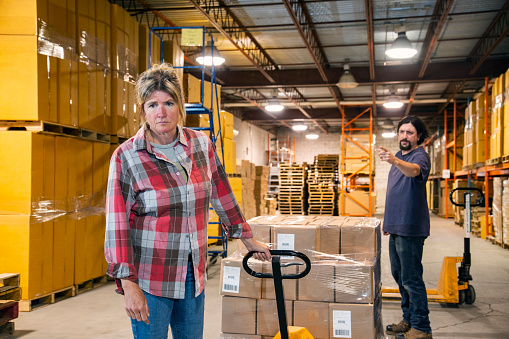The Health and Safety Executive (HSE) has issued updated guidance to help employers protect their staff from work-related violence and aggression.

Britain’s health and safety watchdog has refreshed the guidance as reported incidents of work-related violence and aggression have risen in recent years – numbering 688,000 in 2019-20.
They say that experiencing violence and aggression at work can have a serious impact on someone’s physical and mental health.
Health and safety laws cover work-related violence and aggression
Workplace health and safety laws apply to the risks posed by violence and aggression at work. This means that employers have a legal duty to assess the risk of violence in their workplace and to remove or reduce these risks so far as is ‘reasonably practicable.’

To be termed as work-related, violence and aggression must be in connection with a work activity. This could include violence from members of the public, customers, clients, patients, people receiving care and support, or students towards someone while they are doing their job.
The updated guidance covers which pieces of legislation relate to violence and aggression at work, how to assess the risks, suitable control measures and reporting on – and learning from – incidents.
Updates also serve to remind employers that the HSE’s definition of violence at work includes aggression, such as verbal abuse or threats, and that this could take place face-to-face, online or over the telephone.
Steps to prevent work-related violence and aggression
 The HSE has taken steps to remove outdated content from its guidance regarding violence and aggression at work and replace it with up-to-date practical guidance. This includes examples of ways to prevent work-related violence for different industries, such as retail, education, social care and transport.
The HSE has taken steps to remove outdated content from its guidance regarding violence and aggression at work and replace it with up-to-date practical guidance. This includes examples of ways to prevent work-related violence for different industries, such as retail, education, social care and transport.
The guidance also includes general control measures that employers may need to consider to help prevent violence and aggression at work. This includes:
- Ensuring good visibility throughout the workplace, with adequate lighting to prevent blind spots and ensure workers and others can be seen
- Identifying places where tension could develop, such as by implementing a suitable queuing system where appropriate
- Installing security measures like CCTV, trained security personnel, body-worn cameras, alarm systems and building security
- Displaying signs that remind people to treat each other with respect, and that any abuse to workers will not be tolerated
- Ensuring good communication between employers and workers
- Working closely with others, such as the police, local authorities and local community groups
- Raising awareness with the public to target specific forms of violence
- Considering how workers engage with the public and what elements of their work might trigger people to act aggressively. This could mean proactively managing customer expectations with clear information about issues such as delays
- Effectively managing lone working by making arrangements to keep in touch with people who work away from their base, for example using mobile phones and personal alarms
- Ensuring that you maintain adequate staffing levels to enable you to manage violence and respond quickly to any incidents
The HSE provides advice and guidance about de-escalation techniques that could be utilised to try to prevent work-related violence and aggression.
Training is key to preventing work-related violence and aggression
 The watchdog also identifies training as a key control measure to prevent and manage violence and aggression at work.
The watchdog also identifies training as a key control measure to prevent and manage violence and aggression at work.
The HSE says that training “can provide workers with appropriate skills to reduce or diffuse potential incidents,” and that it should be available to everyone who may be at risk, including cleaners and maintenance workers and temporary or agency staff.
Workers should be trained at a level which is appropriate to the needs of their work activities.
The watchdog says basic training about managing violence and aggression could include:
- Identifying underlying and immediate causes
- Understanding that violence and aggression should not simply be accepted as part of the job
- Recognising warning signs, such as body language
- Relevant interpersonal skills, such as verbal and non-verbal communication skills
- Details of working practices and suitable control measures
- Procedures for reporting incidents
Where workers face a significant risk of physical violence at work, they may need additional training in skills such as physical intervention techniques.
Employers should ensure they are regularly holding refresher training to ensure workers’ skills remain up to date, and that they regularly review their training needs and evaluate training courses for effectiveness.
Support and guidance for workers

The HSE also provides specific guidance on how employers can support their workers after a violent incident – this includes those who are directly involved and any witnesses. The support provided should address the emotional and physical impact of the incident and help workers deal with any resulting stress and mental health conditions.
Workers can also access separate advice and guidance about preventing violence and aggression at work and how they should raise any concerns.
The HSE also ensures that employers and workers can easily access legal advice from other sources and useful information about stress and mental health at work.
The HSE’s Working Minds campaign focuses on preventing work-related stress, depression and anxiety and supporting positive mental health in the workplace.
Learning and development solutions
 First Response Training (FRT) is a leading national training provider delivering courses in subjects such as health and safety, first aid, fire safety, food safety, mental health, health and social care and more.
First Response Training (FRT) is a leading national training provider delivering courses in subjects such as health and safety, first aid, fire safety, food safety, mental health, health and social care and more.
Their workplace health and safety training includes awards in Health and Safety, Conflict Resolution and Personal Safety, Managing and Assessing Risk, Lone Working and Accident and Incident Investigation.
They have previously worked with organisations to develop bespoke training for them in subjects as such Hostile Situations, Conflict Resolution and Personal Safety and De-escalation and Breakaway Techniques.
FRT can also provide specialist mental health training courses, such as Understanding Mental Health, Mental Health Awareness in the Workplace, Managing Stress, Anxiety and Phobias Awareness, Self-Harm Awareness and Suicide Awareness.
They can also provide qualified, approved trainers to deliver accredited Mental Health First Aid (MHFA) training courses, including the Adult, Youth and Lite versions.
A trainer from FRT says:
“No one should have to endure violence or aggression while carrying out their working activities. It’s vitally important that employers assess and address the risks of work-related violence and aggression for their workforce and that they are able to respond appropriately and effectively if any incidents of violence and aggression do occur.”
For more information on the training that FRT can provide, please call them today on freephone 0800 310 2300 or send an e-mail to info@firstresponsetraining.com.
